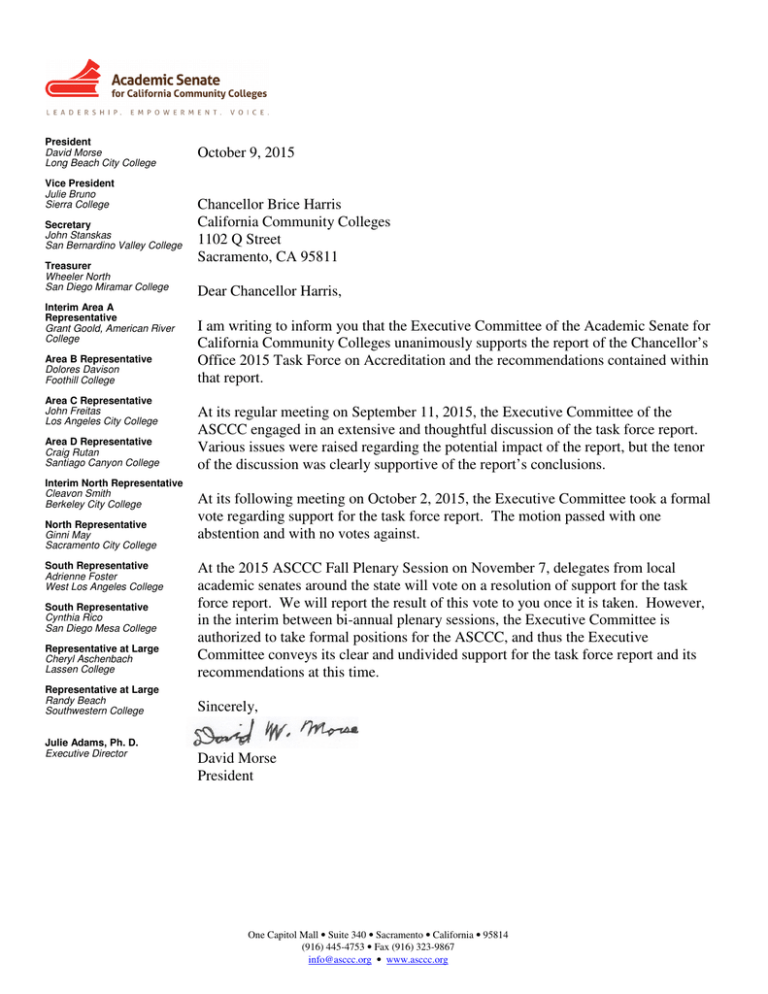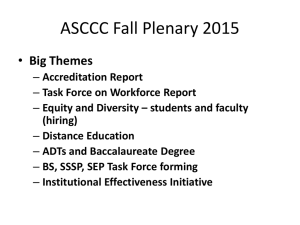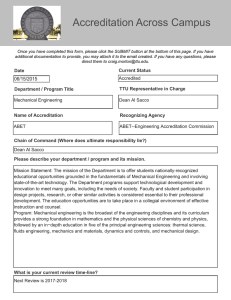October 9, 2015 Chancellor Brice Harris California Community Colleges
advertisement

President
David Morse
Long Beach City College
Vice President
Julie Bruno
Sierra College
Secretary
John Stanskas
San Bernardino Valley College
Treasurer
Wheeler North
San Diego Miramar College
Interim Area A
Representative
Grant Goold, American River
College
Area B Representative
Dolores Davison
Foothill College
Area C Representative
John Freitas
Los Angeles City College
Area D Representative
Craig Rutan
Santiago Canyon College
Interim North Representative
Cleavon Smith
Berkeley City College
North Representative
Ginni May
Sacramento City College
South Representative
Adrienne Foster
West Los Angeles College
October 9, 2015
Chancellor Brice Harris
California Community Colleges
1102 Q Street
Sacramento, CA 95811
Dear Chancellor Harris,
I am writing to inform you that the Executive Committee of the Academic Senate for
California Community Colleges unanimously supports the report of the Chancellor’s
Office 2015 Task Force on Accreditation and the recommendations contained within
that report.
At its regular meeting on September 11, 2015, the Executive Committee of the
ASCCC engaged in an extensive and thoughtful discussion of the task force report.
Various issues were raised regarding the potential impact of the report, but the tenor
of the discussion was clearly supportive of the report’s conclusions.
At its following meeting on October 2, 2015, the Executive Committee took a formal
vote regarding support for the task force report. The motion passed with one
abstention and with no votes against.
Representative at Large
Cheryl Aschenbach
Lassen College
At the 2015 ASCCC Fall Plenary Session on November 7, delegates from local
academic senates around the state will vote on a resolution of support for the task
force report. We will report the result of this vote to you once it is taken. However,
in the interim between bi-annual plenary sessions, the Executive Committee is
authorized to take formal positions for the ASCCC, and thus the Executive
Committee conveys its clear and undivided support for the task force report and its
recommendations at this time.
Representative at Large
Randy Beach
Southwestern College
Sincerely,
South Representative
Cynthia Rico
San Diego Mesa College
Julie Adams, Ph. D.
Executive Director
David Morse
President
One Capitol Mall • Suite 340 • Sacramento • California • 95814
(916) 445-4753 • Fax (916) 323-9867
info@asccc.org • www.asccc.org
College of the Redwoods
Academic Senate
FACULTY MEETING
Friday, October 30, 2015
10:00 to 11:00 AM
Eureka: Learning Resource Center room L105
and
Del Norte: room DM28
(for remote participants, connection information to follow)
AGENDA
1. Update on Professional Development Committee – Kerry Mayer & Crystal Morse
2. Update on Pelican Bay Prison project – Joe Hash
3. Update on Dual Enrollment – Marla Gleave
4. Chancellor’s Office 2015 Task Force on Accreditation,
and
ASCCC support for the Task Force report and its recommendations
– Mark Renner and Connie Wolfsen
5. CRFO Update – Mike Haley
6. Using Popular Media to Analyze Psychological Disorders – Michelle Haggerty
7. Canvas and TelePresence tips/tricks/techniques – Reno Giovannetti
Next Meeting:
December 4, 2015
REDWOODS COMMUNITY COLLEGE DISTRICT
BOARD OF TRUSTEES MEETING
1RYHPEHU
$JHQGD,WHP1R
SUBJECT: &&&&7$6.)25&(21$&&5(',7$7,2183'$7(
5(&200(1'$7,21
)RUGLVFXVVLRQRQO\1RDFWLRQUHTXLUHG
%$&.*5281'
7KH7DVN)RUFHRQ$FFUHGLWDWLRQRIIHUHGWKUHHPDLQUHFRPPHQGDWLRQVWRWKH&KDQFHOORU
DQGWKH%RDUGRI*RYHUQRUVUHJDUGLQJWKHLQYHVWLJDWLRQRIDOODYDLODEOHDYHQXHVIRUHVWDEOLVKLQJD
QHZPRGHORIDFFUHGLWDWLRQZKLOHFRQWLQXLQJWRZRUNFRRSHUDWLYHO\ZLWKWKH$&&-&
KWWSFDOLIRUQLDFRPPXQLW\FROOHJHVFFFFRHGX3RUWDOVUHSRUWV$FFUHGLWDWLRQ5HSRUW
$'$SGI
)ROORZLQJWKLVUHSRUWWKH&KDLURIWKH$&&-&ZURWHWR8QGHU6HFUHWDU\0LWFKHOORIWKH8QLWHG
6WDWHV'HSDUWPHQWRI(GXFDWLRQH[SUHVVLQJFRQFHUQVDERXWWKHSURFHVVXVHGWRSURGXFHWKH7DVN
)RUFHUHSRUWDQGLWVILQGLQJVDQGUHFRPPHQGDWLRQV&KDLUSHUVRQ.LQVHOODH[SUHVVHGKLVEHOLHI
WKDWWKH5HSRUWZDVSDUWRIDQHIIRUWE\WKH&KDQFHOORU¶V2IILFHWRSXQLVKWKH$&&-&EHFDXVHLW
GLGQRWDFFHGHWRSROLWLFDOSUHVVXUHWRUHVFLQGLWVZLWKGUDZDORIDFFUHGLWDWLRQIURPWKH&LW\
&ROOHJHRI6DQ)UDQFLVFR7KH$&&-&DOVRLQIRUPHGPHPEHULQVWLWXWLRQVWKDW:HVW+LOOV
&RPPXQLW\&ROOHJH'LVWULFWDGRSWHGDUHVROXWLRQUHMHFWLQJWKHFRQFOXVLRQVRIWKH&KDQFHOORU¶V
2IILFH7DVN)RUFHRQ$FFUHGLWDWLRQ
7KH$&&-&KHOGD6SHFLDO0HHWLQJRQ2FWREHUWRKHDUIURPPHPEHULQVWLWXWLRQV
UHJDUGLQJWKHLUSHUVSHFWLYHVRQWKH$&&-&UHODWLYHWRWKH7DVN)RUFH5HSRUW7KLUWHHQSHRSOH
JDYHRUDOFRPPHQWDU\DQGDGGLWLRQDOSHUVRQVVHQWLQZULWWHQFRPPHQWV7KH&RPPLVVLRQLVVXHG
DSUHVVUHOHDVHDERXWWKHYDOXHRIWKHGLVFXVVLRQIRUWKH&RPPLVVLRQDVLWUHIOHFWVRQLWVSUDFWLFHV
DQGFRQVLGHUVDGGLWLRQDOFKDQJHVWRWKRVHEHLQJLPSOHPHQWHGWKLV\HDUZLWKWKHQHZ
$FFUHGLWDWLRQ6WDQGDUGV7KH&RPPLVVLRQDOVRFRPPLWWHGWRKDYLQJDGGLWLRQDOPHHWLQJVWR
SURYLGHRSSRUWXQLW\IRULQSXWDQGGLVFXVVLRQRIWKH7DVN)RUFH5HSRUWRURWKHULQSXWPHPEHU
LQVWLWXWLRQVZLVKWRSURYLGH7KHVHPHHWLQJVZLOOWDNHSODFHRQ2FWREHUWKLQ%DNHUVILHOG
&ROOHJHDQG1RYHPEHUWKDWWKH5DQFKR6DQWLDJR&RPPXQLW\&ROOHJH'LVWULFW2IILFHV
$VWKH&RPPLVVLRQJDWKHUVLQSXWIURPPHPEHULQVWLWXWLRQVWKH&RXQFLOIRU+LJKHU(GXFDWLRQ
$FFUHGLWDWLRQ&+($%RDUGRI'LUHFWRUVUHTXHVWHGWKH&RPPLVVLRQWRSURYLGHDGGLWLRQDO
LQIRUPDWLRQZLWKUHJDUGWRVSHFLILF&+($6WDQGDUGV2Q6HSWHPEHUWKH&+($
GHIHUUHGLWVGHFLVLRQWRUHUHFRJQL]HWKH$&&-&DVNLQJWKDWWKH\UHSRUWRQWKHPHWKRGVRI
RQJRLQJFULWLFDOVHOIUHYLHZWKHLQLWLDWLYHVWRHQKDQFHWKHHIILFLHQF\DQGHIIHFWLYHQHVV
WKHYDOXHRIWKHDFFUHGLWLQJRUJDQL]DWLRQWRWKHKLJKHUHGXFDWLRQFRPPXQLW\DQGWKHLPSDFW
Board of Trustees - November 3, 2015
47
RILWVVWDQGDUGVDQGSURFHGXUHVRQLQVWLWXWLRQV&+($LVDQRUJDQL]DWLRQRIGHJUHHJUDQWLQJ
FROOHJHVDQGXQLYHUVLWLHVSURYLGLQJQDWLRQDODGYRFDF\IRU³VHOIUHJXODWLRQRIDFDGHPLFTXDOLW\
WKURXJKDFFUHGLWDWLRQDQGLQFOXGHVVRPHGHJUHHJUDQWLQJSULYDWHSXEOLFDQGIDLWKEDVHG
FROOHJHVDQGXQLYHUVLWLHVDVZHOODVLQVWLWXWLRQDODQGSURJUDPPDWLFDFFUHGLWLQJRUJDQL]DWLRQV
7KH$&&-&KDVEHHQUHFRJQL]HGE\&+($VLQFH
%8'*(7,03/,&$7,216
1RQH
Board of Trustees - November 3, 2015
48
47th FALL SESSION RESOLUTIONS
FOR DISCUSSION ON FRIDAY,
NOVEMBER 6, 2015
Disclaimer: The enclosed resolutions do not reflect the position of
the Academic Senate for California Community Colleges, its
Executive Committee, or standing committees. They are presented
for the purpose of discussion by the field, and to be debated and
voted on by academic senate delegates at the Academic Senate
Spring Plenary Session held November 5 – 7, 2015.
Resolutions Committee 2015-2016
John Stanskas, Executive Committee, Chair
Julie Adams, ASCCC, Executive Director
Cheryl Aschenbach, Lassen College, Area A
Randy Beach, Southwestern College, Area D
Rochelle Olive, College of Alameda, Area B
Michelle Sampat, Mt. San Antonio College, Area C
2015 FALL PLENARY SESSION
RESOLUTIONS FOR DISCUSSION ON FRIDAY, NOVEMBER 6, 2015
2.0
ACCREDITATION
*2.01 F15 Adopt the ASCCC Paper Effective Practices in Accreditation
Whereas, Accreditation is an ongoing concern for all colleges in the California Community
College System;
Whereas, Faculty participation in the accreditation process and the role of faculty in
maintaining an individual college’s accreditation are essential and have been the subject of
many Academic Senate for California Community Colleges (ASCCC) Rostrum articles,
resolutions, and breakout sessions;
Whereas, Resolution 02.01 S12 directed the ASCCC to develop resources, including a paper,
on effective practices for accreditation compliance to be used by faculty at the local level;
Resolved, That the Academic Senate for California Community Colleges adopt the paper
Effective Practices in Accreditation: A Guide To Support Colleges in the Accreditation Cycle
and disseminate the paper upon its adoption.
Contact: Randy Beach, Executive Committee, Accreditation and Assessment Committee
Appendix A: Effective Practices in Accreditation Paper
2.02 F15 Endorse the CCCCO Task Force on Accreditation Report
Whereas, The California Community Colleges Chancellor’s Office (CCCCO) convened the
2014-2015 Task Force on Accreditation to review and address serious concerns regarding
California community colleges’ accreditation process;
Whereas, The president of the Academic Senate for California Community Colleges, several
community college presidents and administrators, a representative from the Faculty
Association of California Community Colleges, a community college board trustee, a
representative from the California Federation of Teachers, and the Vice Chancellor for
Academic Affairs from the California Community College Chancellor’s Office were active
participants in the work of the Task Force on Accreditation and unanimously supported its
findings and recommendations;
Whereas, The recommendations of the Task Force on Accreditation were, in part, based on
ASCCC resolutions, which included recommendations for the Accrediting Commission for
Community and Junior Colleges (ACCJC); and
Whereas, According to the Task Force on Accreditation, “On several occasions the ACCJC
has promised changes and has offered reports detailing their efforts to address concerns, but
these promises and reports have led to few significant improvements”;
Resolved, That the Academic Senate for California Community Colleges endorse the
recommendations of the California Community Colleges Chancellor’s Office Task Force
Report on Accreditation. 1
Contact: Executive Committee
1
http://californiacommunitycolleges.cccco.edu/Portals/0/reports/2015-Accreditation-Report-ADA.pdf.
1
Resolution of the Board of Governors
California Community Colleges
No. 2015-03
Whereas, California Code of Regulations, Title V § 51016 requires each community college to be
accredited by an accrediting agency that is recommended by the Chancellor and approved by the
Board of Governors.
Whereas, the Accrediting Commission for Community and Junior Colleges (ACCJC) is the current
accrediting agency.
Whereas, of the six regions, only the Western Association of Schools and Colleges (WASC) is
subdivided into separate commissions for community and junior colleges (ACCJC) and for
institutions offering bachelor’s and higher degrees (WASC Senior College and University
Commission).
Whereas, with the establishment of community college baccalaureate degree programs and
development of associate degrees for transfer, California community colleges need to be on par
with other community colleges throughout the country and to benefit also from the peer review of
4-year colleges and universities in order to ensure the highest quality of educational services for
students.
Whereas, within a span of 10 years, ACCJC placed 2/3 of all community colleges in California on
some level of sanction; and between 2009 and 2013, ACCJC had a sanction rate of approximately
53% (compared to 12% within other regions).
Whereas, due to ACCJC’s sanctions, the Board of Governors was compelled to appoint special
trustees for two college districts and suspending the authority of democratically elected local
governing boards.
Whereas, through legislative action, state audit, and lawsuits, the people of California have
expressed grave concerns about ACCJC’s lack of transparency, non-collegiality, unfair treatment and
punitive approach toward California community colleges.
Whereas, despite these ACCJC sanctions, the people of California continue to have confidence in
California community colleges, as demonstrated by tremendous investments in the Student Success
Act, creation of BA degrees pilot program, 1900 Associate Degrees for Transfers created within 3
years, and increase concurrent/dual enrollment.
Whereas, despite ACCJC’s conduct, California community colleges continue to seek ways to improve
their educational services by voluntarily participating in the Institutional Effectiveness Partnership
Initiative, a state-funded program with the primary mission of assisting colleges in meeting
accreditation standards.
Whereas, numerous efforts were made throughout the years by community college leaders,
including some members on the Commission and staff, to provide constructive feedback to ACCJC;
and although some progress was made, the changes made by ACCJC were insufficient to change the
negative perception of ACCJC.
27
Resolution of the Board of Governors
California Community Colleges
No. 2015-03
Whereas, two Chancellors of the California Community Colleges have convened three advisory task
forces to address the increased complaints and concerns about ACCJC for over a decade.
Whereas, the 2015 Accreditation Task Force representing a cross section of peers in the California
community colleges unanimously voted to express its loss of confidence in ACCJC; and
recommended that the Chancellor and Board of Governors investigate “all available avenues for
establishing a new model for accreditation” and to do so in expeditious manner, working through
the system’s established consultation process, to bring a recommendation for action to the Board of
Governors by Spring 2016.
Whereas, the following statewide organizations endorsed the 2015 Accreditation Task Force report:
California Community College Trustees (CCCT), Chief Executive Officers of the California
Community Colleges (CEOCCC), Executive Committee of Academic Senate for California Community
Colleges (ASCCC), California Community Colleges Chief Instructional Officers (CIOCCC), Faculty
Association of California Community Colleges (FACCC), Community College Association/California
Teachers Association (CCA/CTA), California Community College Independents (CCCI), and
Community College Council/California Federation of Teachers (CCC/CFT).
Whereas, accreditation is a peer review process, and it is essential that peers trust the process is
fair, transparent, and professional in order for it to be effective and meaningful.
Whereas, the public needs to trust that an accrediting agency recommended by the Chancellor and
approved by the Board of Trustees, pursuant to Title V § 51016, meets the highest standard of
professionalism and expertise.
THEREFORE, BE IT RESOLVED, that the Board of Governors accepts the 2015 Accreditation Task
Force’s findings and recommendations, and HEREBY DECLARES:
The current structure of ACCJC, along with its lack of credibility as perceived by its peers
and the public, no longer meet the current and anticipated needs of California community
colleges.
Thus, in an effort to raise the professionalism of accreditation processes and usher California
community colleges into a new era of baccalaureate degrees and closer ties with 4-year
universities, the Board of Governors hereby directs the Chancellor, working through the
system’s established consultation processes, to bring to the Board of Governors at its March
2016 meeting:
1. A recommendation for action to establish a new model for an accrediting agency; and
2. An implementation plan, along with timeline.
AYES:
NOES:
ABSTAIN: Bielanski
28
CCCCO Task Force on Accreditation Report:
http://californiacommunitycolleges.cccco.edu/Portals/0/reports/2015Accreditation-Report-ADA.pdf (discussed as a report at Sep. 21 BOG meeting)
ASCCC plenary meeting - Nov. 5-7, 2015:
http://www.asccc.org/sites/default/files/Final_Friday_Resolutions_Fall_20
15.docx
BOG meeting - Nov. 16, 2015:
http://extranet.cccco.edu/SystemOperations/BoardofGovernors/Meetings/
November2015Agenda.aspx
http://extranet.cccco.edu/Portals/1/ExecutiveOffice/Board/2015_agendas/
November/2_6_Attachment_ACCJC_Resolution_2015_03.pdf


